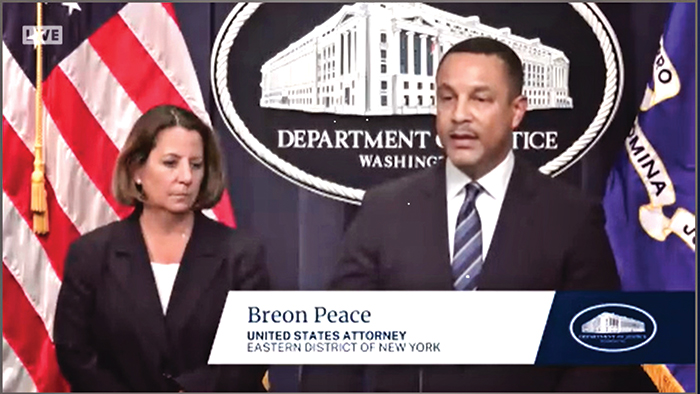Courtesy of U.S. Attorney’s Office, Eastern District of NY
“Financially exploiting the elderly and other victims through fraudulent prize schemes is a form of abuse and deserving of punishment,” U.S. Attorney Peace said.
By Michael V. Cusenza
A Howard Beach man has been sentenced to three years in prison for participating in a $4 million mass mailing scheme that tricked consumers into paying fees for falsely promised cash prizes, federal prosecutors announced on Thursday.
As part of his sentence, Scott Gammon, 48, was also ordered to forfeit $139,611.97.
According to the U.S. Postal Inspection Service, from August 2014 through August 2019, Gammon engaged in a direct-mail scheme that sent fraudulent prize notification mailings to thousands of consumers. The mailings induced consumers to pay a fee, purportedly in return for a large cash prize. None of the consumers who sent a fee ever received such a prize.
Gammon in March 2022 pleaded guilty to conspiracy to commit mail fraud. Two other defendants also pleaded guilty to conspiracy to commit mail fraud for participating in the scheme. Christopher King, 37, copped to the crime on Sept. 15, 2021, and Natasha Khan, 39, pleaded guilty on Dec. 15, 2021. King and Khan are awaiting sentencing.
“Financially exploiting the elderly and other victims through fraudulent prize schemes is a form of abuse and deserving of punishment as today’s sentence demonstrates,” said Brooklyn U.S. Attorney Breon Peace. “A term in prison should deter others from preying on the vulnerable.”
USPIS Inspector-in-Charge Daniel Brubaker added, “Today’s sentencing brings to a close the investigation of Mr. Gammon, who devised a fake prize promotion scheme designed to defraud older Americans and steal from those who believed they had won a prize. Unfortunately, for those who participated, they realized too late that they had been swindled. When a prize did not materialize, and their money was not returned, they became victims. Postal Inspectors remind consumers to be ever vigilant and play an active role in protecting their money. If you’re asked to pay for a prize you didn’t enter to win, it’s a scam.”
Peace noted that the Department of Justice seeks to prevent the widespread losses seniors and other consumers suffer from fraud schemes. The best method to prevent fraud is to share information about the various types of elder fraud schemes with relatives, friends, neighbors and other seniors who can use that information to protect themselves.
If you or someone you know is age 60 or older and has been a victim of financial fraud, help is available at the National Elder Fraud Hotline: 1-833-FRAUD-11 (1-833-372-8311).This DOJ hotline, managed by the Office for Victims of Crime, is staffed by experienced professionals who provide personalized support to callers by assessing the needs of the victim and identifying relevant next steps. Case managers will identify appropriate reporting agencies, provide information to callers to assist them in reporting, connect callers directly with appropriate agencies, and provide resources and referrals, on a case-by-case basis. Reporting is the first step. Reporting can help authorities identify those who commit fraud, and reporting certain financial losses due to fraud as soon as possible can increase the likelihood of recovering losses. The hotline is staffed seven days a week from 6 a.m. to 11 p.m. ET. English, Spanish and other languages are available.

